OCCUPY CENTRAL NIGHT NINE: Full coverage of the night's events
PUBLISHED : Monday, 06 October, 2014, 10:19pm
UPDATED : Tuesday, 07 October, 2014, 8:02am
Welcome to our continuing 24-hour Occupy Central coverage.
After a hectic week, Occupy Central protest sites were quiet on Monday as some demonstrators left for work, others remained and authorities kept their distance.
Occupy supporters and the government are currently in a deadlock over negotiations. Preliminary discussions to prepare for talks with Chief Secretary Carrie Lam Cheng Yuet-ngor have begun, but progress has been slow, with both sides disagreeing on the guidelines behind the meetings.
Stay tuned for all the breaking news.
6.45am: Here's a peek at our front page today:
6.10am: Day breaks over Hong Kong. After a few hours' sleep or rest, people camped out in Mong Kok stirred and awoke to a cool, dry morning - the tenth day of the civil disobedience movement. Around 100 sit-in protesters remain there.
At the Occupy Central camp in Admiralty, demonstrators have hung a sign that reads: "Protest against the police's collusion with triads to beat up citizens brutally." Ever since attacks by masked thugs on Friday in Mong Kok and some scuffles at the weekend, the protest zones have generally been peaceful.
5.46am: Just tuning in to the pro-democracy protests in Hong Kong? Get a five-minute crash course on the major events so far:
5.15am: Admiralty: A few protesters get a jarring start to the morning when a seemingly drunk man appears and lectures protesters on why they should leave.
"You can continue to camp here ... but your movement is doomed to fail," the man, wearing a white cap, said. He was overheard saying that blocked roads were inconveniencing the public.
He also said Hongkongers should be grateful to Beijing because it helped end the Japanese occupation of Hong Kong during the second world war, while Britain "treated Hongkongers as colonial" subjects.
Isaac Tong, a social worker, said was lectured by the man for about 20 minutes. "He said he spent more than HK$200 taking a cab just to come and talk to us ... I told him we weren't trying to overthrow the Communist Party but he went on and I knew we couldn't communicate so I stopped talking to him," Tong said. "He also told me to learn more about history."
The man chastised another protester for another 15 minutes. Then he accepted a bottle of water from the protester, put down HK$90 for it, and left. The demonstrator, Louis Ton Ka-lok, reported the cash to police as lost property.
4.50am: Mong Kok: Ping Cheng, who works as a chef of Japanese cuisine for a catering group, showed support for Occupy by hanging out there in the wee hours. He passed the time by drinking canned beers near the junction of Nathan Road and Argyle Street, and watching the goings-on at the protest camp.
Cheng said it was his second time to come and had been apolitical - until police used tear gas on protesters on September 28. "It's now like how the Tiananmen Square developed. I missed the events [in 1989]; it would be a huge loss if i miss [pro-democracy protests] again," he said.
He said his brother-in-law was a policeman and they often argued about Occupy. Cheng said he didn't think police would clear the sit-in any time soon, and even if they did, that wouldn't scare him away.
4.39am: A policeman spoke to the Post about how officers’ family lives have been affected by the Occupy protests.
In the past week, he said, many officers had been working for at least 16 hours a day, while some senior officers worked 30-hour shifts before getting a break. “If you are working like that, would you make [the best use of] the remaining two hours at home to take a rest?” he said.
"But my wife and my parents have been understanding ... When this is all over, I'll spend more time with them.”
In the past week, he said, each officer had to do multiple shifts of one to two hours each, standing guard at police cordons. And when they are not in the front lines, there are other tasks for them in the occupied zones, he said. Officers usually get a 10- to 15-minute break every several hours, he added.
4.12am: As government representatives and student activists hammer out plans for a dialogue with Chief Secretary Carrie Lam, Scholarism student activist Joshua Wong Chi-fung earlier told protesters in Mong Kok that he would ask the Federation of Students for more details about the meeting.
Wong said he was happy to see that the two sides had reached a consensus to start a dialogue on political reform as soon as this week.
So far, that may be as far as the consensus goes: students said they were at odds with the government on where to hold the talks, its format (a casual chat or a consultative session) and the parameters of the debate.
3.46am: Students are looking forward to a “concrete achievement” in a proposed dialogue on election reform with chief secretary Carrie Lam Cheng Yuet-ngor. But what would protesters consider as concrete?
Chester Chan, 24, a customer services officer, said the government should at least promise to broaden the voter base of the election nominating committee.
Beijing ruled on August 31 that the committee – which will be responsible for nominating two to three candidates for the 2017 chief executive poll – must be modelled on the current 1,193-member Election Committee. Besides 70 lawmakers, all other members were elected by about 240,000 corporate or individual voters.
“We have to see how big the [electorate] will be enlarged to,” Chan said, adding that the expansion should not be confined to the insurance and financial services sectors, which agreed on widening their voter base. “But at the very least it must be hand-picked by the [Beijing] government."
“We know it is difficult to achieve genuine universal suffrage or oust CY Leung at this stage ... But if we don't stand up, the [next] chief executive could be [even worse],” Chan said.
James Kwong, 25, who works in construction and who has joined the protests after work in the last nine days, said: “Even if Lam promised to listen to public opinion, it is not a substantive achievement and victory for us.”
He agreed that widening the electoral base would be a key start. Kwong is part of a group of some three dozen protesters who said they would push on even if the Federation of Students calls off the sit-in.
3.02am: A man accused of sexually harassing an Occupy protester wants to sue local newspaper Apple Daily for libel after it published a report on the incident.
Restaurant owner Raymond Liu said his lawyers were also studying whether to sue Occupy Central's leaders for damages, after his crab restaurants lost money during the pro-democracy protests.
Liu was pictured clinging to a female protester's leg during a scuffle between anti-Occupy groups and protesters in Causeway Bay, prompting the woman - a performing arts student - to shout "harassment" and later burst into tears.
Liu, however, said in a press conference on Monday that he was injured in the row. He showed bruises on his arms and legs to the media. One of his lawyers said Liu filed a bodily harm report to the police.
He also blamed the Occupy movement for causing losses of at least HK$500,000 (or 80 per cent of his revenue) to his crab restaurants in Causeway Bay, Wan Chai and Tsim Sha Tsui.
2.32am: Don't miss our latest videos on the Occupy Central:
Hong Kong shop owners and mainland tourists tell us what they think of the protests
Civil servants go back to work on Monday as protesters continue to blockade areas around the government HQ
2.13am: Elsewhere in Admiralty, the public forums have stopped and the mattresses are out so protesters can catch some shut-eye after a tiring but peaceful day continuing the civil disobedience movement.
There is a cool breeze and light drizzle, so some are huddling together or sheltering under tents. Others who are still awake chat, smoke and check their social media feeds.
Based on an SCMP reporter's estimates, there are fewer than 500 protesters camped out on the main protest zone on Harcourt Road.
1.51am: Admiralty: About 60 protesters are planning to stay overnight outside CY Leung's office. Outside the Legislative Council building, about 80 students are resting or sleeping on the ground.
There are also a few after-midnight reinforcements. Harold Law Cheuk-ho and Tony Ng Hin-Tung, both 16, had just arrived. They said they decided to stay for the night on Tim Wa Avenue because of the small turnout.
Law, a Form Four student, said he was coming to show support and because he was worried that the police could take action.
Later, the pair moved to Harcourt Road. They said they went to school and rested during the day so they could join in the after-hours.
They vowed to keep coming back as long as the protests are ongoing. Ng, from the Vocational Training Council's Kwai Fong campus, said: "We will stay till the end."
1.30am: A sudden spell of rain in Mong Kok has sent protesters running for cover. The Hong Kong Observatory has forecast "cloudy periods with isolated showers at first" on Tuesday, then fine, dry and sunny weather over the next eight days.
1.15am: Britain's Foreign and Commonwealth Office has released a report on the economic impact of the Hong Kong pro-democracy protests. It said that, barring any "unexpected escalation", the protests would have few long-term economic effects.
Though the retail and tourism sectors felt the pinch, the report, released on Monday, said there were few signs of capital flight, and the financial as well as logistics and trade sectors, which are worth 15 and 26 per cent of GDP respectively, were "continuing normally".
The report cited the benchmark Hang Seng Index's 3 per cent drop as of October 3 as marginal compared to the 50 per cent drop during the 2008 financial crisis. It noted how credit agency Fitch ruled out a short-term impact on ratings and how the markets have not revised down their GDP growth estimates.
It also said that the retail slump, particularly in the luxury sector, "will have minimal influence over the strategic choices made by the 1,300 international firms who use Hong Kong as a regional base for Asia-Pacific – a region projected to grow at over 5 per cent this year".
However, the report warned of risks to Hong Kong's consumption-driven growth, which emerged during the protests. It said mainland tourists were increasingly consuming mid-to-low-end consumer goods, causing a dramatic fall in luxury goods sales, and this could drop further if Beijing does not lift its suspension on group mainland visas.
"One bank’s preliminary analysis suggests losses of up to 0.3 per cent of GDP, around £540 million [HK$6.69 billion], if protests continue for a month; another suggests this week alone will cost £173 million [HK$2.1 billion]," the report said.
12.45am: Admiralty: A 71-year-old man earlier visited students still camped out in the streets to say that while he admires them for fighting for a cause, they should "go home and fight another day".
Yau Tak, who visited the protesters four times this week and this time brought his wife along, said that as a senior citizen, he was responsible for telling the students to pull back for their safety.
"I was born during the [second world] war and have been through the civil war. I have witnessed a lot during my time but I'll tell you, these students have made Hong Kong and Chinese history. They have achieved greatness," he said. But it is time for them "to take a step back and go home for their safety. They can fight another day".
"Reason and justice is on their side. Going home does not equate to giving up. They have already won," Yau said.
12.34am: Giving a late-night boost to the sedate Mong Kok crowds, radical pan-democrat lawmaker Wong Yuk-man gave a 10-minute speech urging more support and protection of the students protesting for democracy.
Wong has been a brash but staunch pro-democracy advocate. After he hurled a glass in CY Leung's direction at a Legislative Council meeting, Wong was arrested last July on suspicion of common assault, on the same day that five members of a July 1 pro-democracy march were arrested. The incidents were seen as a sign the government was toughening its stance in the face of mounting calls for genuine universal suffrage.
And last year, Wong snubbed a luncheon that would have marked the first time Beijing’s liaison office director Zhang Xiaoming sat down with Hong Kong lawmakers across the political spectrum.
12.18am: Admiralty: A TVB news crew was forced to stop its stand-up report on Harcourt Road after protesters began loudly chanting: "CCTVB" (after mainland China's state broadcaster CCTV) and "see see dan dan", an expression akin to "whatever", in reference to complaints that the station has been reporting on Occupy too conservatively.
The crowds also started chanting "Support HKTV", which is TVB's rival.
12.05am: Mong Kok: About 500 sit-in protesters, according to a reporter's estimate, and a number of onlookers are lingering at the bustling junction of Nathan Road and Argyle Street. The atmosphere is peaceful and relaxed.
A public forum is ongoing, punctured by occasional applause. Other groups formed circles and talked about their political views, while others sang Cantonese rock group Beyond's Under a Vast Sky, a popular anthem during the recent protests.
An estimated 200 uniformed and plain-clothes policemen were standing at every corner around the site.
11.48pm: Admiralty: A bus carrying police officers, as well as a truck transporting dinner boxes, have just left the government complex in Tamar, Admiralty. Since police caused alarm by shipping riot gear to Tamar last week (some said using an ambulance), students have been on guard about what goes in and out of the government HQ.
A group of about 10 protesters who refuse to give up their base started tying metal barriers together with plastic strips to make it harder to remove the barricade on Lung Wo Road.
"I am doing this because police cheated us at beginning and they carried weapons inside," said Alice Ng, 26, a master's degree student.
"All we want is to be informed of what's inside the trucks. They let us check a few times, but now because there's less people they don't even reply to us. That's why I feel angry," she said.
Ng decided to camp out in Admiralty because she wanted to prevent any more weapons from being transported to the government complex. "We feel that we are not getting enough respect. I am a bit disappointed," she said.
11.32pm: With a target of holding talks this week, students protesters are concerned about some details of the proposed dialogue.
Federation of Students deputy leader Lester Shum said constitutional affairs undersecretary Lau Kong-wah's stance on the matter - saying that the national legislature's framework should be followed if Hong Kong wants electoral reform - might be an obstacle that makes constructive dialogue difficult.
He also said that the students wanted the dialogue to be held in the University of Hong Kong, or any other university, and that they were at odds with government representatives on this point.
"We also want it to be a substantive dialogue, not just a casual chat or a consultative session," added Shum, who appeared in a press conference with fellow student leaders Nathan Law and Eason Chung.
11.17pm: Fifty-nine financial sector heavyweights have signed an open letter on the Occupy protests, saying: “Disrupting the social order of Hong Kong is not helpful to the development and discussion of the political reforms. Nor would it solve any problem.”
Among the signatories are Executive Council member and Asia Financial Holdings president Bernard Chan, legislator and Bank of China (Hong Kong) Trustees chairman Ng Leung-sing, and Bangkok Bank Public Company vice-president Leo Kung Lin-cheng.
They also expressed concern about clashes and conflicts during the protests in recent days. “If the situation continues to worsen, the success made after the hard work and efforts of generations of Hong Kong people would go down to the drain. The victims will be Hong Kong people,” the letter said.
10.55pm: After the second preparatory meeting in two days with the Federation of Students, undersecretary for constitutional affairs Lau Kong-wah said he had agreed with student representatives that the first official dialogue should be held this week, and that the session will be open. But he said they couldn't agree on the venue of the dialogue yet, and what issues about political reform to discuss.
He will meet the students again tomorrow to resolve these two problems, Lau said, and hoped this would be the last preparatory meeting before the students' dialogue with the chef secretary Carrie Lam.
Lau also said he agreed with the students that instead of an one-off meeting, there should be multiple rounds of dialogue, which would be "conducted on an equal and mutually-respectful basis".
Lau also said the national legislature's framework should be followed if Hong Kong wanted to reform its electoral system.
10.40pm: Admiralty: Scholarism's Joshua Wong Chi-fung urges the government not to use different tactics to suppress Hong Kong people participating in the movement. "The more Hong Kong people are suppressed, the greater the resistance," said Wong. "I urge the government to show sincerity and begin discussions with students as soon as possible." Wong said he was optimistic that occupations of Mong Kok, Admiralty and Causeway Bay could pressure Chief Secretary Carrie Lam Cheng Yuet-ngor to meet students sometime this week.
10.30pm: Admiralty: Wong Yeung-tat, leader of radical activist group Civic Passion takes to the stage in Admiralty, urging protesters not to give up Occupy zones in Mong Kok and Causeway Bay. He said mainstream media such as TVB continued to spread "white terror" about how dangerous these areas were, when in reality, the situation on the ground had already improved.
"We have got past the worst," he said. "We shouldn't have to pull out of these areas just because of some political considerations... I must say, if we had really lost Mong Kok and Causeway Bay, this protest site at Connaught Road Central would not have been sustained. People, don't forget: every Occupy point has been fought for very hard."
10.20pm: Causeway Bay: Numbers remain strong at Causeway Bay this evening, with around 200 people remaining at the Hennessy Road protest camp. Police officers guarding the camp remained at a distance while protesters sleep or sit, with many expecting the barricades to be breached. The threat exists but the police are seemingly not taking action. The fact that the camp with so few people still remains intact is astonishing for some.
District councillor Paul Zimmerman, who made an appearance in Causeway Bay, urged protesters to move to the main camp in Admiralty: "I think people in Causeway Bay should pack up and and go to Admiralty. "Why occupy the city with an empty space? Return or reduce part of the pressure on the city. They'll be seen to be doing some good to the community by giving people the city back."
Civic Passion leader Wong yeung-tat attracts a crowd of 50 people taking lively Q&As before heading to the government office in Admiralty.
Meanwhile Hennessy Road resident Minh Tran described the Occupy protests as "not much of an inconvenience." He said it has been really nice with much less traffic and pollution in the area.
"Report assesses the impact of the street protests on the Hong Kong economy. Confidence in the economy is holding up well, though short term impacts for retail and tourism."
10.10pm: Admiralty: representatives from student activist groups and Occupy Central founder Benny Tai appear on stage to address the crowd.
Scholarism's Joshua Wong Chi-fung said the government could not even compromise on basic requirements such as treating students on the same level and executing students' requests.
"Is it a publicity stunt or are they really listening to the voice of the students?" he asked.
The crowd should not be retreating and what needed to be withdrawn was the election framework laid out by Beijing, Wong said, questioning the appeal by university heads asking protesters to leave.
Tai hoped people affected by the movement could understand who caused the inconvenience.
"Who is the mastermind?" he yelled. The crowd replied: "CY Leung."
10pm: The crowd in Admiralty is noticeably smaller than previous nights, yet the protesters appear to be as united as ever. A group of ethnic minority protesters were invited to the stage to give a speech. "Although our appearance is different, we are true blue Hongkongers," one protester said onstage. He said he had been touched by the efforts of the students, and over the past few days, "we have never felt such a strong sense of belonging," said the man in Cantonese.
The protesters then led the crowd to a sing-along session of one of local band Beyond's popular tunes. Here's a live stream from the protest stage in Admiralty:
9.45pm: About 50 people are currently gathered in front of the chief executive's office, with some of them having just finished work. Luss Wong, 31, an IT specialist, decided to come after work to show his dissatisfaction with the government's performance.
"This government, CY Leung, lies to citizens." said Wong. "The main problem is the elections in 2017. I think he doesn't report our views to the Chinese government."
Wong decided to join the protest in Tamar because he was aware that today most people would be working and the area would be emptier. He also said he has little hope in the conversations between students and government.
Meanwhile, a taxi passed by Lung Wo Road and a passenger shouted at protesters, calling them "brainless" and yelling "you all deserve to sleep on the streets". The protesters started clapping and ironically saying: "Thanks for the support". Many other occupants in cars passing by today have cheered the protesters.
9.30pm: While there has been an outcry from the commercial sector on how the Occupy movement has affected the city's business activities, organisers of the Asia Contemporary Art Show said it had a limited impact on its sales. Fair director Mark Saunderson said many collectors still made the effort to visit the hotel art fair, which took place in the Conrad Hong Kong, despite traffic around Admiralty being sealed off throughout the four-day fair period. “We are pleased with the outcome, considering the protests which continued through all four days of the show."
9pm: Undersecretary for Constitutional and Mainland Affairs Lau Kong-wah and representatives of the Federation of Students are set to hold another round of preparatory talks at the University of Hong Kong campus at 9pm, before talks with Chief Secretary Carrie Lam Cheng Yuet-ngor can go ahead.
8.45pm: Mong Kok: A police presence builds in Mong Kok, with plain-clothed and uniformed officers stationed at all four corners of the protest site to prevent possible clashes. More people joined the sit-in at the junction of Nathan Road and Argyle Street after work. Fion, who works in the catering industry, says she came after work to support the student protesters. "I don't think it is too dangerous because there are many people here."
8.15pm: A group of more than 50 mainland lawyers, scholars and other citizens have issued a statement in support of Hong Kong people's pursuit of democracy - while calling for democratic progress on the mainland.
In the statement signed by lawyers including human rights lawyer Teng Biao and others from different parts of the country, the group says Chief Executive Leung Chun-ying "misled" the national legislature into giving the city a framework for the 2017 chief executive election.
"[Leung] must be held responsible for misleading the National People's Congress Standing Committee (NPCSC) with his report of political reform," the statement read. "He must listen to the advice of different social sectors and make remedial measures."
"At the same time we feel that China is closely linked to Hong Kong's," it says. The group strongly demands the NPCSC to start, without hesitation, legislating for the direct elections of deputies to local people's congresses at provincial and municipal levels, "so that people's rights to elect and to be elected are implemented and a government by the people is built."
The group also said it objects to any violence and human rights abuses. It notes that Hong Kong protesters' demand for public nomination in the 2017 election is legitimate.
http://www.scmp.com/news/hong-kong/article/1611027/mainland-lawyers-show-support-reform-protests-continue-outside


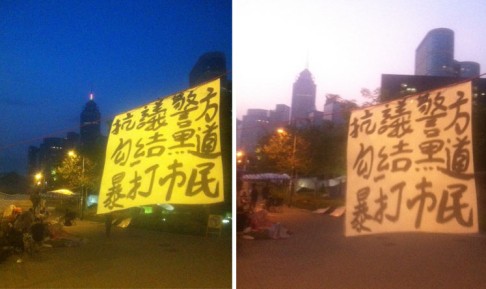
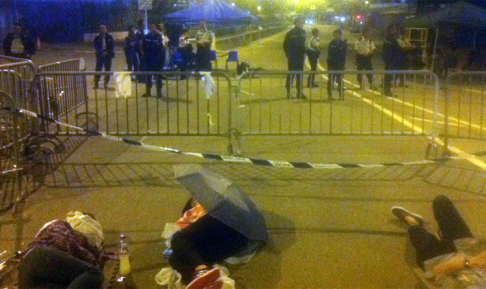
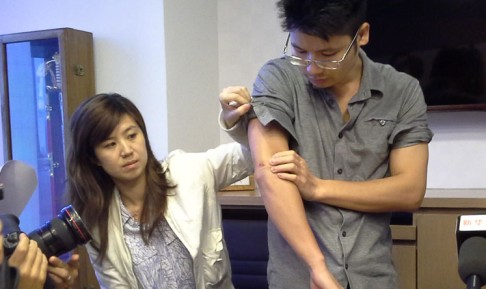
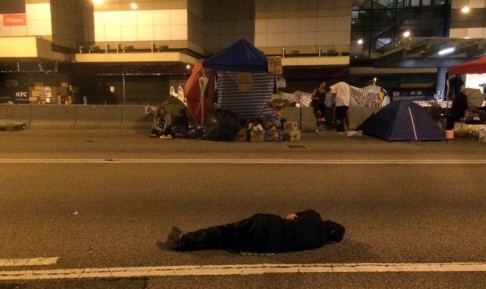

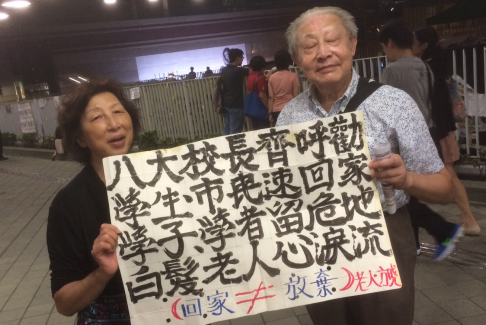
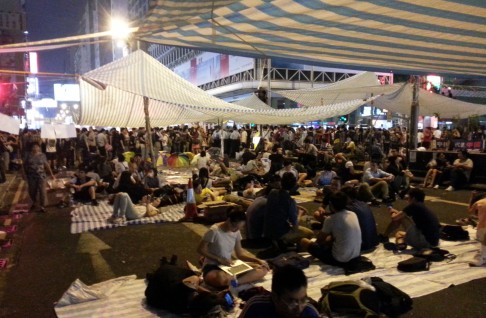
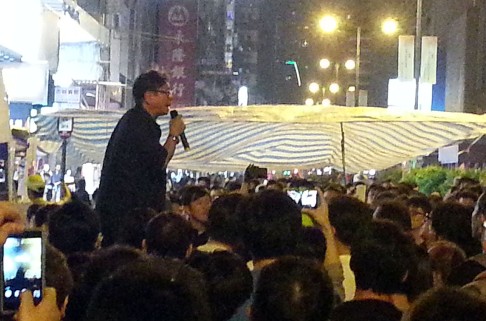

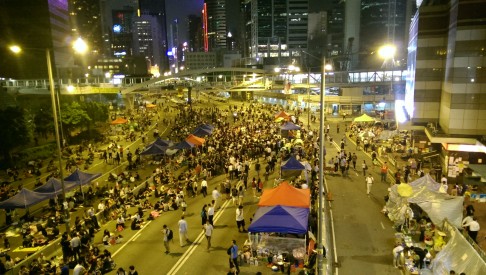
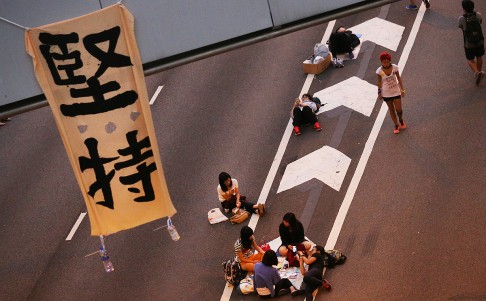
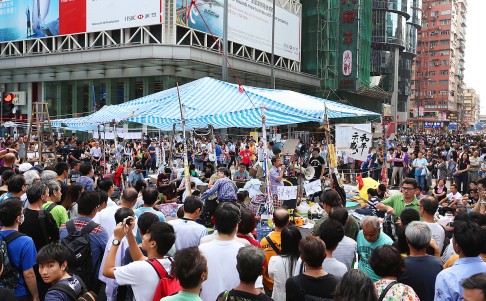
沒有留言:
張貼留言